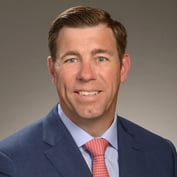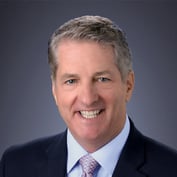In his career, former FPA president Jim Barnash has run his own advisory firm, worked for several large financial services companies, and run his own consulting firm to help advisors grow. Now Barnash has joined Merion Wealth Partners, a company backed with private equity, that is entering the somewhat crowded world of advisor firm rollup and consolidation firms.
Merion Wealth, though, highlights its differentiation from the HighTowers and United Capitals and Focus Financials of the world by design–the advisors will eventually run the firm and will decide among themselves its ultimate business destiny.
Richard Hughes, a former Envestnet PMC co-president and Rittenhouse Investments executive who joined Berwyn, Pa.-based Merion Wealth as president in March, said in an interview with AdvisorOne on Monday that as the company’s advisor network grows, “the advisors will have controlling shareholders votes; they’ll decide the ultimate destiny.”
 Barnash (left), who will continue to live in the Chicago area but “will be doing a lot of travel,” noted that while a majority of the ownership of Merion Wealth “right now lies in the hands of the management team and board, the majority of the ownership will be in the hands of the advisors.” Partnership gives advisors “leverage plus scale on pricing. But it also provides for a long-term succession strategy to preserve your legacy … with a defined mechanism for how you’ll get out—or provide your own succession planning.”
Barnash (left), who will continue to live in the Chicago area but “will be doing a lot of travel,” noted that while a majority of the ownership of Merion Wealth “right now lies in the hands of the management team and board, the majority of the ownership will be in the hands of the advisors.” Partnership gives advisors “leverage plus scale on pricing. But it also provides for a long-term succession strategy to preserve your legacy … with a defined mechanism for how you’ll get out—or provide your own succession planning.”
Barnash, who is senior VP, said in an interview Monday with AdvisorOne that Merion Wealth is “providing a platform for a partnership, so advisors will have a say-so in the business.” The platform, he said, will provide a range of back-office services for advisors, and will have “great tools” for risk management, asset management and technology, but “the direction is to provide advice to clients and get paid for it—not just [levying a fee for] assets under management to get paid—the AUM trend is primarily meant for the largest firms to move from transaction to fees,” but that model doesn’t necessarily meet advisors’ best interests, or clients’.
Barnash’s role will be in business development, “identifying advisors who fit the target,” walking them through the process of joining Merion, “to make sure there’s a good cultural fit,” and then “helping them continue in their growth strategies.”
The partnership would be especially appealing to advisors from their 30s into their 50s who want to be in the business for a long time and who are already independent, though Barnash says “we wouldn’t rule out” breakaway brokers. The right cultural fit would be advisors who want to grow but have hit a “ceiling of complexity” in dealing with compliance, technology or capacity issues and “don’t have access to the capital to grow out of it.”
Merion Wealth, he states emphatically, is “not for those who are in their late 50s or 60s who want to park and then go away.” Barnash says part of the value to advisors is gaining access to Merion Wealth’s board, who he says possesses much in the way of entrepreneurial talent and which in the past “have figured out a way to make complicated businesses more simple.”








 October 10, 2011 at 10:40 AM
October 10, 2011 at 10:40 AM










 Speaking of Barnash, Hughes (left) said “he could have had a job anywhere,” and so is pleased to have him join Merion Wealth. “We have a team in place right now,” said Hughes, to handle the number of advisory firms in its pipeline, noting Merion has just hired a chief compliance officer and is in talks to hire a chief operating officer, “but much of the staffing will be determined by deal flow.” For advisory firms who join Merion Wealth—either using Merion’s corporate RIA or its broker-dealer, “there is a cash component and an equity component,” Hughes said, “which will go on in perpetuity,” until the advisor partners deem it time for a liquidity event, though he pledges “we won’t sell to a strategic partner,” and that those advisors merely looking to cash out won’t fit the culture test at Merion.
Speaking of Barnash, Hughes (left) said “he could have had a job anywhere,” and so is pleased to have him join Merion Wealth. “We have a team in place right now,” said Hughes, to handle the number of advisory firms in its pipeline, noting Merion has just hired a chief compliance officer and is in talks to hire a chief operating officer, “but much of the staffing will be determined by deal flow.” For advisory firms who join Merion Wealth—either using Merion’s corporate RIA or its broker-dealer, “there is a cash component and an equity component,” Hughes said, “which will go on in perpetuity,” until the advisor partners deem it time for a liquidity event, though he pledges “we won’t sell to a strategic partner,” and that those advisors merely looking to cash out won’t fit the culture test at Merion.